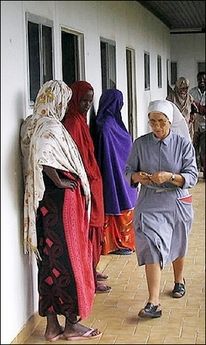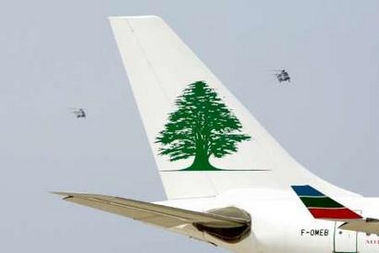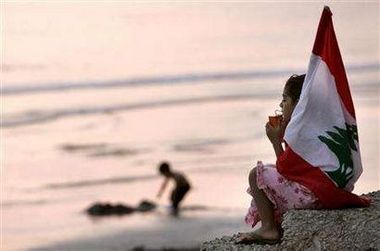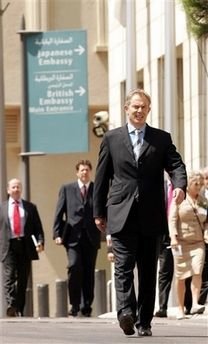 ASSOCIATED PRESS, NAIROBI, Kenya
ASSOCIATED PRESS, NAIROBI, Kenya
 One week before I left for Beirut, my family had dinner with my uncle who was visiting from Beersheva, Israel. Halfway through the evening, he turned to look at me. He put down his fork.
One week before I left for Beirut, my family had dinner with my uncle who was visiting from Beersheva, Israel. Halfway through the evening, he turned to look at me. He put down his fork.
 By Jonathan WrightReuters, BEIRUT (Reuters) - Abu Abbas, a car dealer from south Lebanon, has ready answers to the litmus-test question which has traditionally split his country down the middle -- whether it should opt out of the Arab-Israeli conflict. Lebanon is an inseparable part of the Arab world, he says, and conflict with Israel is inevitable as long as any Arab land remains under Israeli occupation or Israel even exists.When I see Palestinians in Gaza and the West Bank suffering every day, the victims of racism and destruction, I consider that to be an attack on all humanity," said the 30-year-old bachelor, who supports the Shi'ite Muslim movement Hizbollah.
By Jonathan WrightReuters, BEIRUT (Reuters) - Abu Abbas, a car dealer from south Lebanon, has ready answers to the litmus-test question which has traditionally split his country down the middle -- whether it should opt out of the Arab-Israeli conflict. Lebanon is an inseparable part of the Arab world, he says, and conflict with Israel is inevitable as long as any Arab land remains under Israeli occupation or Israel even exists.When I see Palestinians in Gaza and the West Bank suffering every day, the victims of racism and destruction, I consider that to be an attack on all humanity," said the 30-year-old bachelor, who supports the Shi'ite Muslim movement Hizbollah.
Abu Abbas lives in the southern suburbs of Beirut, where hundreds of thousands of Shi'ite Muslims from the South have settled over the past three decades and where the Shi'ite guerrilla movement has a large and loyal following.Shi'ites say Hizbollah and its weapons are needed to defend Lebanon against Israel, but many disagree in a country where politics have always been shaped by sectarian divisions, which fueled a long civil war.Poorer than average, under-represented in the religion-based system which governs Lebanese politics but demographically on the rise, the Shi'ites feel empowered by the outcome of the one-month war between Israel and Hizbollah in July and August."The Divine Victory" and "A Victory from God" read the slogans on Hizbollah billboards along Hadi Hassan Nasrallah Avenue, a main street named for the eldest son of Hizbollah leader Sayyed Hassan Nasrallah.Hadi died fighting the Israelis in 1997 and the slogans are a tribute to the family name, which means "God's victory" in Arabic. Less than 2 miles away, in the middle-class Christian-dominated district of Ashrafiyeh, the mood is rather different after the latest round of conflict with Israel. Ashrafiyeh Christians now offer a more diverse range of opinions, reflecting the political divisions within the Christian community and their more modest ambitions.
 By Mark Deen, Sept. 11 (Bloomberg) -- Prime Minister Tony Blair drew protesters in Beirut as he met with his Lebanese counterpart Fouad Siniora after refusing to condemn Israel's bombardment of the country. ``Given the events of the past few months, it would be surprising if there weren't demonstrations,'' Blair's spokesman Tom Kelly said today.
By Mark Deen, Sept. 11 (Bloomberg) -- Prime Minister Tony Blair drew protesters in Beirut as he met with his Lebanese counterpart Fouad Siniora after refusing to condemn Israel's bombardment of the country. ``Given the events of the past few months, it would be surprising if there weren't demonstrations,'' Blair's spokesman Tom Kelly said today.
Blair, on the first visit to Lebanon by a serving British prime minister, is seeking to cement peace in the Middle East after a 34-day war between Israel and Hezbollah fighters. Britain refused to call for an immediate cease-fire when hostilities began July 12, instead siding with U.S. demands for a lasting agreement. Lebanese cabinet ministers and other lawmakers will meet with Blair today, though ministers from the political wing of Hezbollah, a Shiite Muslim militia based in southern Beirut and south Lebanon, won't attend. Parliamentary speaker Nabih Berri canceled a planned meeting with Blair, saying he was out of the country.
Lebanese television showed pictures of crowds packed into central Beirut waving flags and banners to protest against Blair's visit. A demonstrator carrying a banner interrupted a joint press conference with Blair and Siniora and was removed. The United Nations is seeking to prevent a recurrence of hostilities that left 1,200 people dead in Lebanon and 159 in Israel. UN Security Council Resolution 1701 established a cease- fire that began on Aug. 14. The measure calls for an international force to be deployed in southern Lebanon and for Hezbollah to disarm and stop importing weapons. At the press conference, Blair called for the full implementation of the resolution. He said Britain has committed 40 million pounds ($75 million) to help reconstruction efforts in Lebanon this year and is ready to do more.
Khazen History


Historical Feature:
Churches and Monasteries of the Khazen family

St. Anthony of Padua Church in Ballouneh
Mar Abda Church in Bakaatit Kanaan
Saint Michael Church in Bkaatouta
Saint Therese Church in Qolayaat
Saint Simeon Stylites (مار سمعان العامودي) Church In Ajaltoun
Virgin Mary Church (سيدة المعونات) in Sheilé
Assumption of Mary Church in Ballouneh
1 - The sword of the Maronite Prince
2 - LES KHAZEN CONSULS DE FRANCE
3 - LES MARONITES & LES KHAZEN
4 - LES MAAN & LES KHAZEN
5 - ORIGINE DE LA FAMILLE
Population Movements to Keserwan - The Khazens and The Maans
ما جاء عن الثورة في المقاطعة الكسروانية
ثورة أهالي كسروان على المشايخ الخوازنة وأسبابها
Origins of the "Prince of Maronite" Title
Growing diversity: the Khazin sheiks and the clergy in the first decades of the 18th century
Historical Members:
Barbar Beik El Khazen [English]
Patriach Toubia Kaiss El Khazen(Biography & Life Part1 Part2) (Arabic)
Patriach Youssef Dargham El Khazen (Cont'd)
Cheikh Bishara Jafal El Khazen
Patriarch Youssef Raji El Khazen
The Martyrs Cheikh Philippe & Cheikh Farid El Khazen
Cheikh Nawfal El Khazen (Consul De France)
Cheikh Hossun El Khazen (Consul De France)
Cheikh Abou-Nawfal El Khazen (Consul De France)
Cheikh Francis Abee Nader & his son Yousef
Cheikh Abou-Kanso El Khazen (Consul De France)
Cheikh Abou Nader El Khazen
Cheikh Chafic El Khazen
Cheikh Keserwan El Khazen
Cheikh Serhal El Khazen [English]
Cheikh Rafiq El Khazen [English]
Cheikh Hanna El Khazen
Cheikha Arzi El Khazen
Marie El Khazen